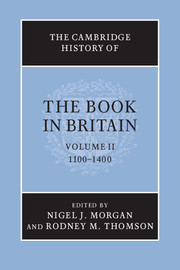Book contents
- Frontmatter
- Preface
- The roles of books
- Book production
- Readership, libraries, texts and contexts
- 9 Library catalogues and indexes
- 10 University and monastic texts
- I Biblical exegesis, theology, and philosophy
- II Latin learning and Latin literature
- III Encyclopaedias
- 11 Law
- 12 Books for the liturgy and private prayer
- 13 Compilations for preaching and Lollard literature
- 14 Spiritual writings and religious instruction
- 15 Vernacular literature and its readership
- 16 History and history books
- 17 Archive books
- 18 Scientific and medical writings
- 19 Music
- 20 Illustration and ornament
- List of abbreviations
- Bibliography
- Photo credits
- General index
- Index of manuscripts
- Plates 1
- Plates 2
- References
III - Encyclopaedias
from 10 - University and monastic texts
Published online by Cambridge University Press: 28 November 2008
- Frontmatter
- Preface
- The roles of books
- Book production
- Readership, libraries, texts and contexts
- 9 Library catalogues and indexes
- 10 University and monastic texts
- I Biblical exegesis, theology, and philosophy
- II Latin learning and Latin literature
- III Encyclopaedias
- 11 Law
- 12 Books for the liturgy and private prayer
- 13 Compilations for preaching and Lollard literature
- 14 Spiritual writings and religious instruction
- 15 Vernacular literature and its readership
- 16 History and history books
- 17 Archive books
- 18 Scientific and medical writings
- 19 Music
- 20 Illustration and ornament
- List of abbreviations
- Bibliography
- Photo credits
- General index
- Index of manuscripts
- Plates 1
- Plates 2
- References
Summary
Only for slightly over 100 years, beginning probably with Delisle’s essay in the Histoire littéraire de la France, has ‘encyclopaedia’ been used to define medieval compilations that aimed to present a universe of learning. In the wake of de Bouard’s influential 1930 article, scholars have extended the term to many kinds of compilations. Since encyclopaedic texts arranged according to systems of knowledge, such as theology or the liberal arts, are covered elsewhere in this volume, for the purposes of this section ‘encyclopaedia’ refers to a compilation whose contents attempt a description of the natural order. In Britain in the year 1100 the term ‘encyclopaedia’ in this sense can be applied to only a few texts. Isidore of Seville’s Etymologiae (or Origines, written in 636) established a comprehensive model covering both the natural worlds and the artes. His De natura rerum (612–14) established a more selective model limited to the heavens and the globe. The De rerum naturis (or De universo) of Rabanus Maurus, written in 842–52, re-ordered the contents of the Etymologiae and added allegories. So similar are the contents of Isidore’s and Rabanus’ encyclopaedias that some copies of the De rerum naturis (e.g., Oxford, St John’s Coll., ms. 5, from Reading, s. xii ex.) are titled Etymologiae. In the early years of the eighth century, Bede combined material from a modest seventh-century Irish encyclopaedia, De ordine creaturarum, with Isidore’s De natura rerum to produce his own De natura rerum.
- Type
- Chapter
- Information
- The Cambridge History of the Book in Britain , pp. 244 - 249Publisher: Cambridge University PressPrint publication year: 2008
References
- 1
- Cited by



